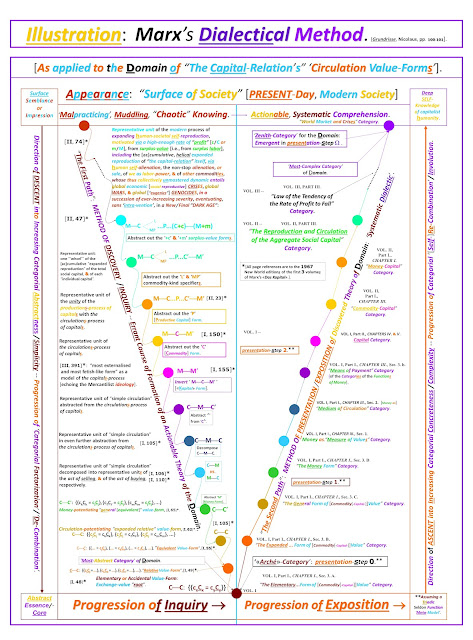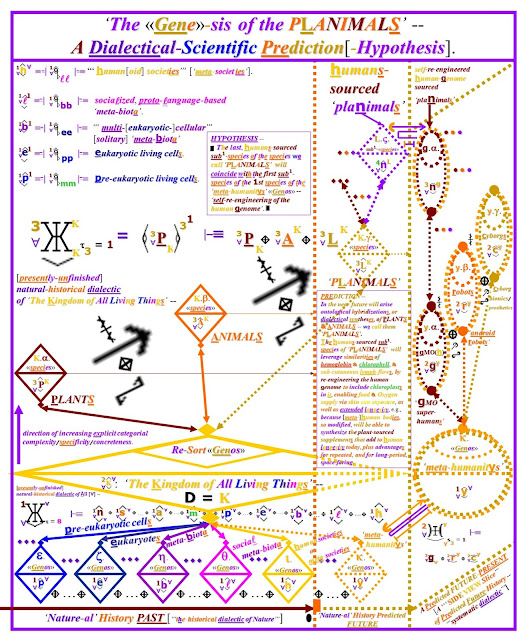Dear F.E.D. Dialectics Blog Participant,
Below are two salient quotes on the "dialectics of nature" controversy, the first from Jean-Paul Sartre, the second from Bertell Ollman, plus a record of a recent dialogue about them in which I took part --
The Quotes.
1. [from Jean-Paul Sartre, Search For a Method, translated by Hazel E. Barnes, Vintage Books [New York: 1968], p. xii] --
"Ought we then to deny the existence of dialectical connections at the center of inanimate Nature? Not at all. To tell the truth, I do not see that we are, at the present stage of our knowledge, in a position either to affirm or to deny. Each one is free to believe that physico-chemical laws express a dialectical reason or not to believe it."
2. [from Bertell Ollman, The Dance of the Dialectic: Steps in Marx's Method, University of Illinois Press [Chicago: 2003], pp. 96-97] --
"What are called the "laws of dialectic" are those movements that can be found in one or another recognizable form on every level of generality, that is, in the relations between qualities that fall on each of these levels, including that of inanimate nature. …
Naturally, the particular form taken by a dialectical law will vary somewhat depending on its subject and on the level of generality on which this subject falls.
The mutually supporting and undermining movements that lie at the core of contradiction, for example, appear very different when applied to the forces of inanimate nature than they do when applied to specifically capitalist phenomena.
Striking differences such as these have led a growing band of critics and some followers of Marx to restrict the laws of dialectic to social phenomena and to reject as "un-Marxist" what they label "Engels's dialectics of nature".
Their error, however, is to confuse a particular statement of the laws, usually one appropriate to levels of generality where human consciousness is present, for all possible statements.
…To be adequately apprehended, such movements on each level of generality must be seen as expressions of laws that are specific to that level as well as versions of more general laws.
Most of the work of drafting such multilevel statements of the laws of the dialectic remains to be done."
The Dialogue.
In response to my citing the quotes rendered above, Vlad Bugera wrote back with the following commentary on them [edited slightly for compatible syntax].
Reply --
"... I agree with Ollman against Sartre: of course, dialectics is inherent to
inanimate nature. If we research really complete systems in their development,
we can see it: Ilya Prigogine's synergetics (from chaos to order) demonstrates the three
basic dialectical laws within inanimate nature clearly."
My Reply to That Reply [edited to add further clarifying content] --
I could not agree more with your views, including your pointing out how Ilya Prigogine's Nobel Prize-winning work on Nonlinear / Nonequilibrium Thermodynamics, and later work on Nonlinear Dynamical Systems Theory, corroborate the dialectical character of "inanimate" -- actually, of decidedly self-animate, self-reflexively self-developing ["nonlinear"] -- Nature.
The dialectic of nature in its pre-human[oid] phases is not a "dialectic without subjects", but is one utterly replete with "subjects" and with "subject-ivity", in the general meaning of the terms "subject" and "subject-ivity", although not, of course, yet in terms of human[oid], self-aware "subjectivity".
But, starting at least with the swarms of bosons, quarks, and leptons believed to have populated our cosmos early-on, the cosmos is populated with entities that fulfill the "subject" role, of action initiation, in Indo-European sentences describing the subjects' actions upon the objects of Nature, then, and ever since.
This 'sentence-iality' includes both those cases wherein the "natural objects" acted upon by these "natural subjects" are other than those "natural objects" -- the merely "flexive" and "fluxive" cases -- but also those cases wherein the "natural objects" acted upon by these "natural subjects" are the self-same populations of [ev]entities -- the "self-reflexive", "self-refluxive", "nonlinear" ["higher degree"] cases, the very cases which constitute the essential core of the most dialectical, "self-aufheben" processes of nature.
That is, Nature -- Natural History -- exhibits a "qualo-quantitatively" -- an 'ONTO-quantitatively" -- growing 'meta-population' of populations of natural "subject-objects", or, better, of "subject-verb-objects"; of "eventities" -- of "eventities which are both each-other-transforming, and self-transforming.
The nonlinear "partial" and "total" differential equations-systems that formulate nonlinear thermodynamics and nonlinear dynamical systems theory also express the dialectics of nature especially when the "singularities" of these equations -- moments at finite values of the t [time] parameter when a division by zero arises, typically marking the transition from system "self-evolution" to system "self-meta-evolution" -- to new-ontology-adding system self-REVOLUTION -- are taken into account.
Moreover, your point goes precisely to why I am so excited about the F.E.D. "Dialectical Theory of Everything"!
What F.E.D.'s Marxian immanent critique of "natural" arithmetic, in general, and what Karl Seldon's work, in particular, have achieved, is to discover a "non-standard model" of the "natural" numbers, one which is an extreme opposite of the standard model of the "natural" numbers, and one whose "elements" "behave" DIALECTICALLY.
Those same "elements" -- new KINDS of [meta-]numbers ["aufheben operators"] -- also provide solutions to an equation which is the extreme "aufheben-negation" of Boole's "Fundamental Law of Thought" equation of the original Boolean arithmetic/Boolean algebra.
The F.E.D. "first axiomatic system" thus constitutes also a "CONTRA-Boolean Algebra" [one which, of course, aufheben-conserves/contains the Boolean Algebra "fundamental law of thought" equation, but which also supersedes it]; an algebra interpretable as a Dialectical Logic.
This new, dialectical arithmetical/algebraic language is powerful enough to express a univocal "Dialectic of Nature" as a whole — i.e., to dialectically, via concretized versions of the "aufheben" operation alone, generate representations of all known categories of cosmological ontology, in the same order as the historical order in which each such ontological category arose [i.e., was first concretely instantiated] in the natural history of the known cosmos — by means of an equation involving just seventeen symbols [if those symbols are counted in the most maximal way; less otherwise].
F.E.D. has also applied that language to generate compact and startlingly-revealing systematic-dialectical models of the contents of Marx's masterpiece, Capital, as well as historical-dialectical models of the historical "meta-evolution" of the social relations of production, of the historical "meta-evolution" of the social forces of production, of the historical "meta-evolution" of human social formations' "geo-morphologies" / "human geographies", etc., etc.
F.E.D. got to this new, dialectical-ideographic language by, in effect, in my view, by fulfilling the joint implication of the Goedel completeness theorem and incompleteness theorems at the level of first order Peano "natural numbers" arithmetic.
Mathematical logician John W. Dawson, Jr., also a biographer of Goedel, described this joint implication as follows, in his biography of Goedel ["Logical Dilemmas: The Life and Work of Kurt Goedel", A.K. Peters, Ltd., Wellesley, MA., 1997], pp. 67-68 [square-bracketed parenthetical comments mine] –
"Most discussions of Goedel's ["first incompleteness"] proof … focus on its quasi-paradoxical nature.
It is illuminating, however, to ignore the proof and ponder the implications of the theorems themselves.
It is particularly enlightening to consider together both the [Goedel] completeness and incompleteness theorems and to clarify the terminology, since the names of the two theorems might wrongly be taken to imply their incompatibility.
The confusion arises from the two different senses in which the term "complete" is used within logic.
In the semantic sense, "complete" means "capable of proving whatever is [generally] valid," whereas in the syntactic sense it means "capable of proving or refuting each sentence of the theory."
Goedel's completeness theorem states that every (countable) first-order theory, whatever its non-logical axioms may be, is complete in the former sense: its theorems coincide with the statements true in all models of its axioms.
The incompleteness theorems hold also for higher-order formalizations of number theory.
If only first-order formalizations are considered, then the [Goedel] completeness theorem applies as well, and together they yield not a contradiction, but an interesting conclusion:
Any sentence of ["natural" numbers] arithmetic that is undecidable must be true in some models of Peano's axioms [for the "natural" numbers] (lest it be formally refutable) and false in others (lest it be formally provable). In particular, there must be models of first-order Peano arithmetic whose elements do not "behave" the same as the natural numbers.
Such non-standard models were unforeseen and unintended, but they cannot be ignored, for their existence implies that no first-order axiomatization of ["natural"] number theory can be adequate to the task of deriving as theorems exactly those statements that are true of the [standard] natural numbers."
Regards,
Miguel


















